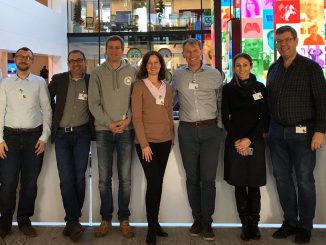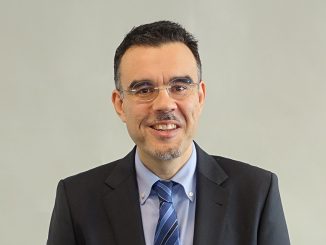
Munich Business School is proud to announce the recipients of the newly established DGOR Research Award, awarded for the first time in 2025 in collaboration with the German Society for Operational Risk Management (DGOR). This annual award honors exceptional final theses that explore topics in sustainability and/or operational risk.
This year, four outstanding graduates were selected for their innovative and high-quality work:
- Laura Eich for researching “The Impact of Sustainable and Ethical Innovation on Consumer Motivations and Willingness to Pay in the Luxury Jewelry Market”
- Finn Sinnecker for analysing “Green Goals: Evolving FC Bayern Munich’s Partnership Landscape for a Sustainable Future”
- Lina Baur for diving deeply into“Economic Subdisciplines along the Sustainability Spectrum”
- Andrej Albrecht for doing “Qualitative Research on Financial OKRs and Their Role in Self-Financed Scaling of Tech-Startups”
Congratulations to all recipients on this remarkable achievement. Munich Business School is honored to recognize the academic excellence of the students and proud to count them among our alumni.
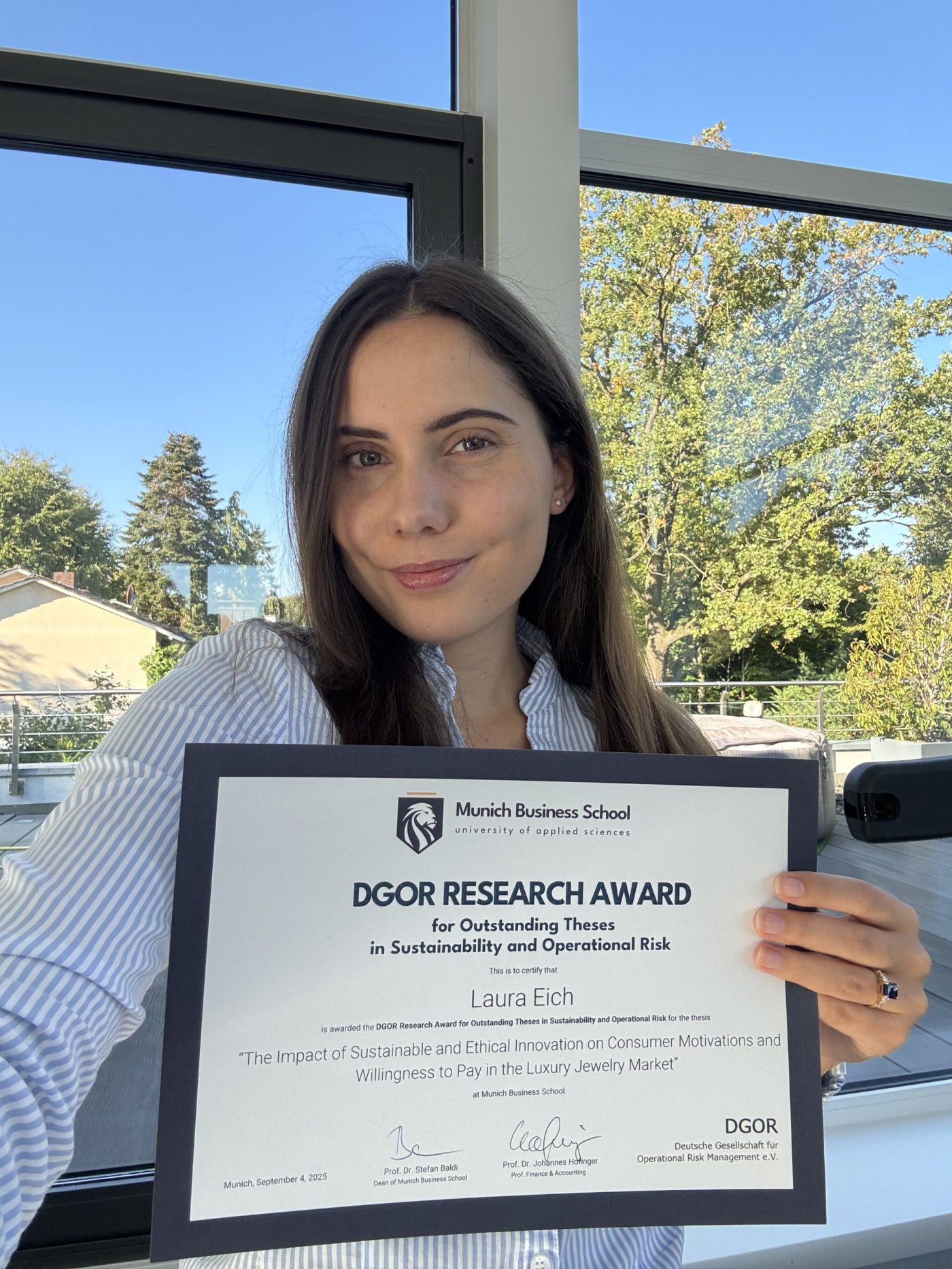
Laura Eich finds that the growing emphasis on ethical consumption and sustainability has led to significant changes in the luxury jewelry industry, especially with the popularity of lab-grown diamonds. Although these alternatives provide environmental and ethical advantages compared to traditionally mined diamonds, their status in the luxury market is still unclear. Her thesis examines how of lab-grown diamonds influence consumer motivations and willingness to pay, as well as the factors that affect their acceptance as a genuine luxury alternative.
The results of an online survey with 552 participants show that although consumers usually agree with the idea of sustainability, traditional luxury factors like price and material quality still have a stronger influence on their buying choices than ethical concerns. Lab-grown diamonds are most appealing to consumers when they offer financial advantages and demonstrate quality parity with natural diamonds. Younger consumers (under 35) are more open to ethical alternatives, and women respond more positively to framing. Social influence had limited impact, but resale guarantees significantly increased willingness to buy.
Laura’s study concludes that lab-grown diamonds are unlikely to succeed by imitating traditional luxury values based on rarity or exclusivity. Instead, brands may gain advantages by using a unique positioning strategy focused on accessible luxury, customization, and independent purchase marketing for women. These findings provide direction for brands which want to understand the evolving needs of modern luxury consumers.
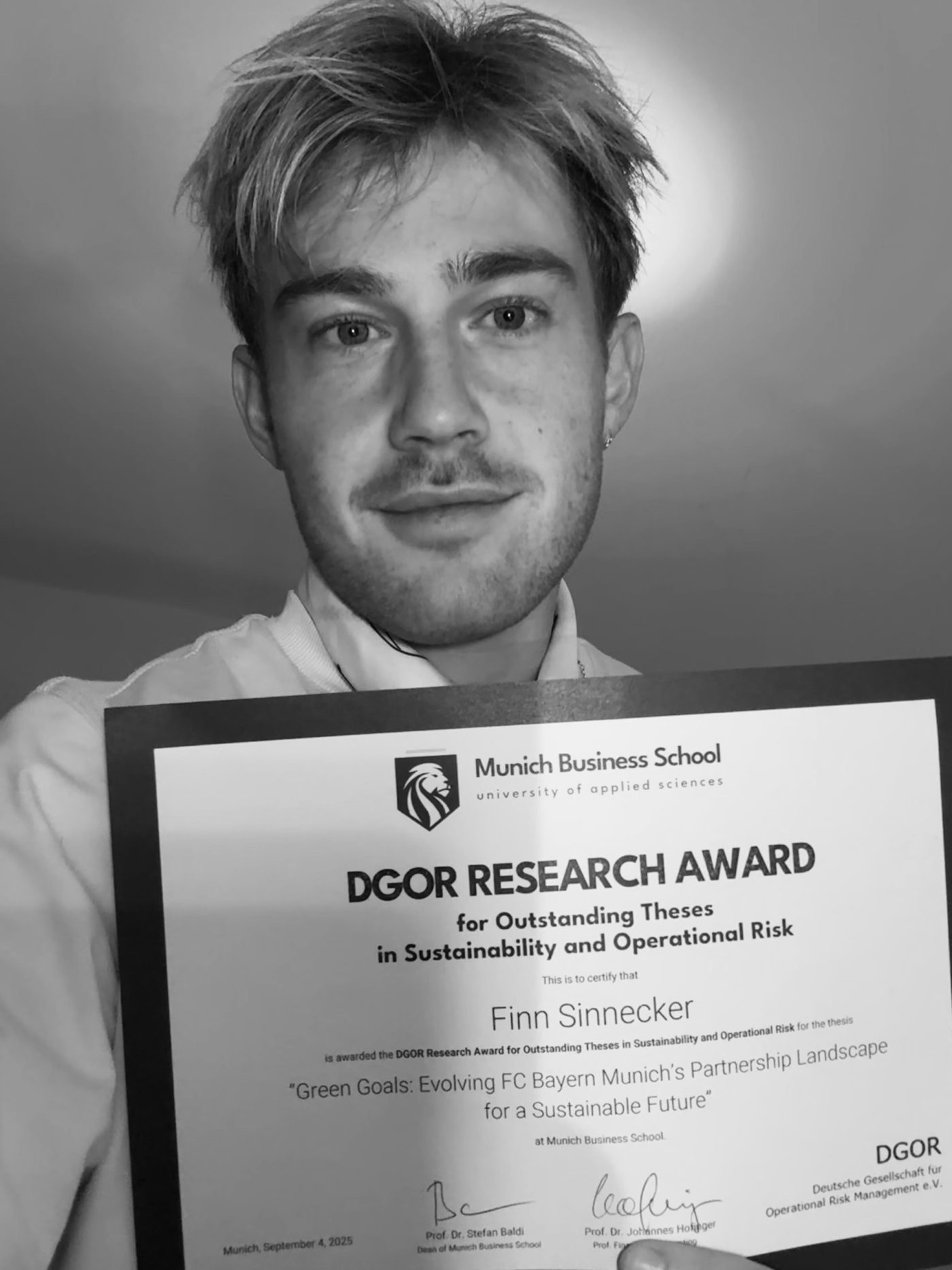
Finn Sinnecker explores the powerful role football clubs, under the spotlight of FC Bayern Munich, can play in promoting sustainability, given their global reach and influence on fans’ attitudes and behaviors. With climate change, resource scarcity, and environmental degradation presenting urgent challenges, the platform that football clubs like FC Bayern Munich possess, positions them as ideal advocates for sustainability. By integrating environmentally focused partnerships, these clubs have the potential not only to champion responsible practices, but also to inspire their vast fan bases to adopt pro-environmental behaviors in their personal lives.
The primary research question of Finn’s study is: What effects can be achieved through a partnership characterized by sustainability? Supporting questions examine the impacts on the environment, society, and profitability. A qualitative triangulation approach which comprises analyses of research papers, industry reports, and football sustainability reports, as well as the implementation of an expert interview, allowed to propose multiple strategic approaches for FC Bayern Munich.
Results indicate that fans respond favorably to clubs’ pro-environmental initiatives, which translates into increased purchase intentions by fans, as well as the transfer of sustainable implementation measures in their private lives. On the other side, sponsors who align with a club’s sustainability goals benefit from enhanced public perception, consumer loyalty and commercial benefits.
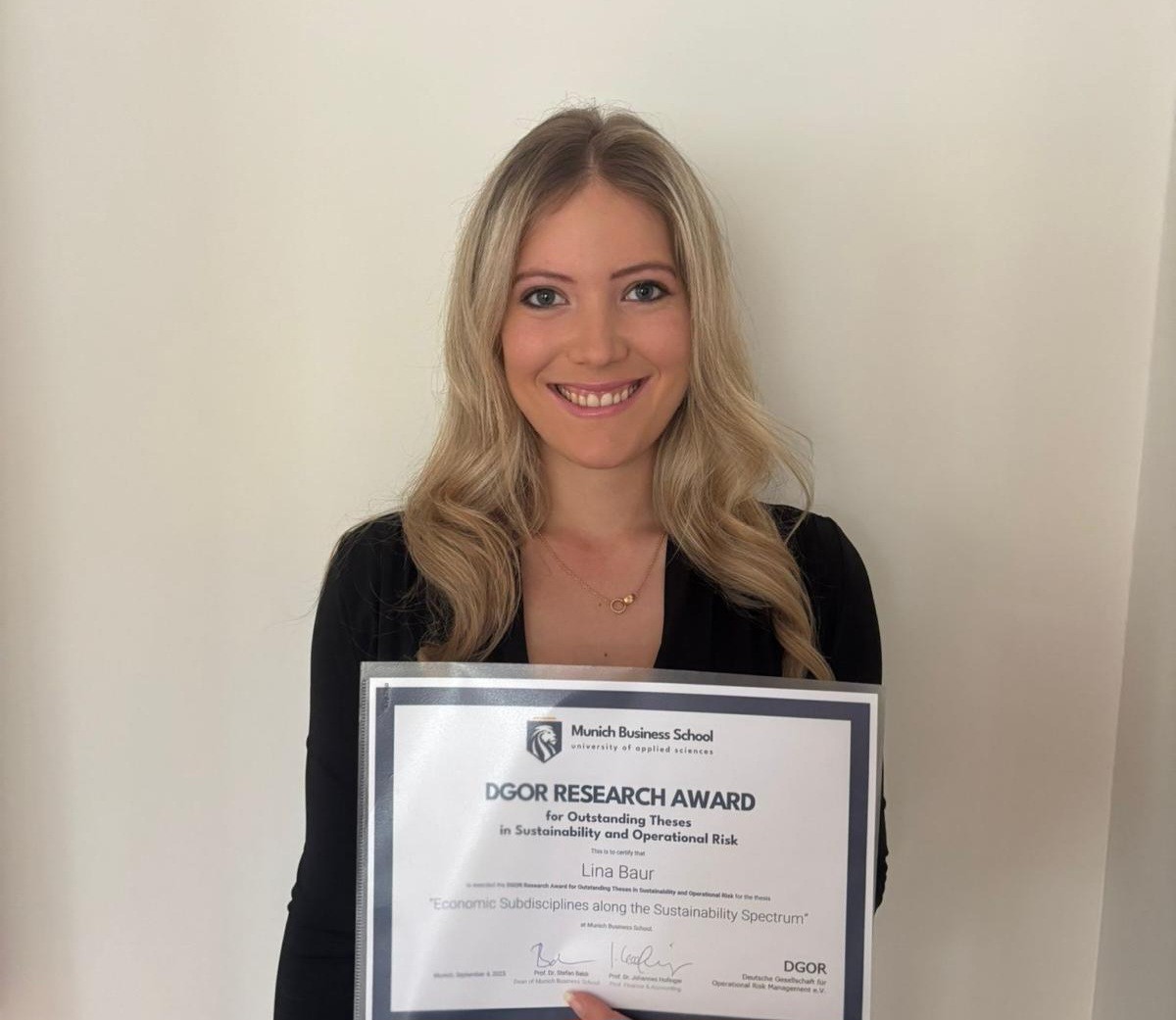
Lina Baur examines in her thesis the integration of sustainability within economic subdisciplines, investigating their alignment with different levels of sustainability. The classification system of the American Economic Association is employed to facilitate an examination of the contributions of various economic subdisciplines to social and environmental sustainability.
The methodology comprises a thematic analysis, which is employed to assess sixteen economic subdisciplines in accordance with their sustainability orientations. This comprehensive analysis entails the formulation of a comprehensive codebook and the attainment of high inter-rater reliability in coding, thereby elucidating the subtle nuances in sustainability commitments among the disciplines.
The findings categorize the subdisciplines into varying levels of sustainability alignment, ranging from very weak to very strong. Ecological economics and socio-ecological economics in particular are emerging as advocates of strong sustainability principles, in contrast to subdisciplines with a weaker focus.
Lina’s thesis concludes with an examination of the implications for business education, economic research and economic policy. It proposes that academic curricula should be enhanced to integrate strong sustainability principles, thus equipping future economists with the skills to address global challenges effectively. Furthermore, it proposes a fundamental transformation towards strong sustainability frameworks within the realms of economic research and policy-making, with the objective of engendering systemic change and ecological responsibility. Ultimately, the thesis advocates for transformative actions at the institutional and governance levels to prioritize sustainability in decision-making processes and policy formulation.
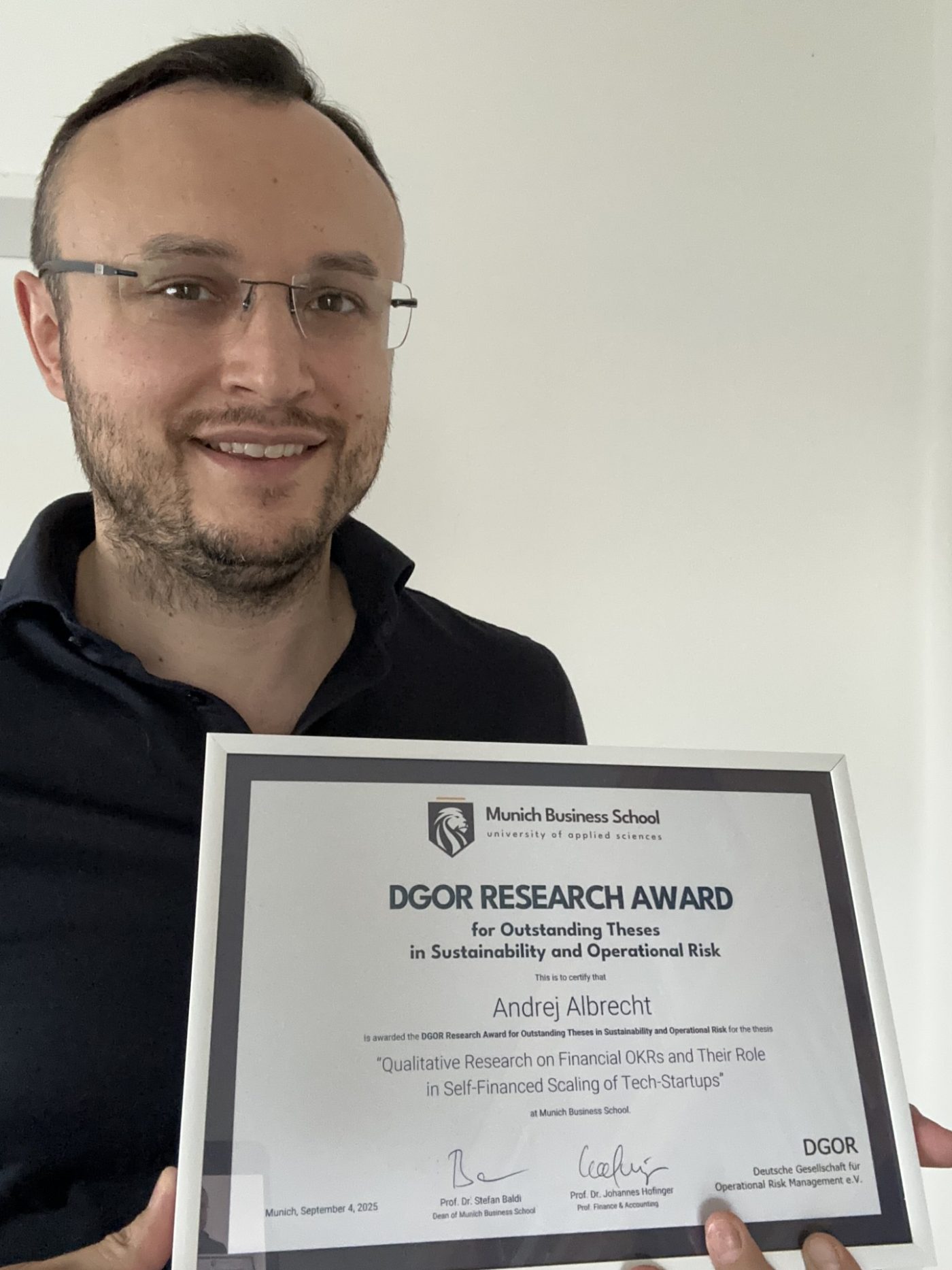
Andrej Albrecht explores in his thesis, how financial Objectives and Key Results (OKRs) can support the self-financed growth and scaling of tech startups. Many founders experience difficulties when growing their companies without external funding. These challenges are often linked to financial planning, unclear goals, or strategic misalignment. The main objective of Andrej’s research is to examine how financial metrics, structured planning processes, and OKRs can improve decision-making and enable sustainable scaling.
The study follows a qualitative research design that combines a comprehensive literature review with seven expert interviews. The participants were founders and C-level executives from German tech startups at different growth stages. The interviews were conducted in a semi-structured format and analyzed using thematic coding. The core topics of analysis included goal-setting practices, the use of financial ratios, scaling strategies, and methods for identifying growth opportunities.
The findings show that many startups do not use structured financial goal-setting systems in the early phases of their development. While OKRs are rarely applied in a formal way, many founders implement similar principles in practice, such as aligning team efforts and tracking progress. Interviewees who applied structured approaches reported greater clarity in their decision-making, particularly in periods of rapid growth or uncertainty.
The study also highlights a group of key financial metrics, including Customer Acquisition Cost (CAC), Customer Lifetime Value (CLV), burn rate, runway, and Self-Financeable Growth Rate (SFG), which can help assess scaling readiness and prevent financial overstretching.
The DGOR Research Prize at MBS marks an inspiring milestone in recognizing academic excellence and applied research in sustainability and operational risk management. As Prof. Dr. Johannes Hofinger, Professor of Finance and Accounting at Munich Business School, emphasizes, “These theses reflect the analytical rigor, creativity, and real-world relevance that define the MBS spirit.”
Munich Business School congratulates all awardees on their remarkable achievements and is proud to count them among its alumni. Their research not only showcases academic excellence but also provides valuable insights for a sustainable and responsible future in business.
For more information about the German Society for Operational Risk Management, visit www.dgor.org or connect with DGOR on LinkedIn.


